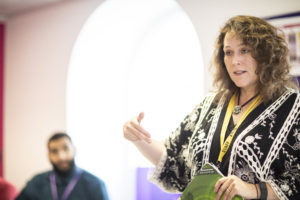
Posted on 5th June 2019 by New College Group
Our IELTS exam top tips
Whether you are looking to study at your dream university, obtain a visa or start a career in a country where English is the native language, our IELTS exam top tips will help you succeed and achieve that top score.
There’s no doubt about it, preparation is key to helping you achieve the grade you want in your IELTS exam.
One of the best ways to prepare is to take an IELTS practice exam. Not only do these sample tests give you an idea of what is to come for the real thing, but they will also provide you with valuable experience and help to boost your test-taking confidence.
You can take a practice exam by visiting the British Council website, or view sample test questions through the IELTS Test Takers area.
Additionally, take a look at our skill-by-skill IELTS exam top tips to prepare for your upcoming test.
Listening
This test takes around 30 minutes to complete. During the test, you will be asked to listen to recordings of 4 native English speakers and then answer a series of questions in writing. You’ll be tested on your ability to understand both general and detailed information, understand opinions and attitudes, and follow the ideas in an academic speech.
There are a total of 40 questions of varying difficulty levels and, to score a 7 or above, you’ll need to answer at least 30 correctly.
Our top tips:
- Immerse yourself in the language: Listen to British news, podcasts and documentaries to get the hang of listening to and understanding complex information.
- Listen to English every day: Make it a habit to listen to English podcasts on your daily commute, listen to English radio whilst you’re cooking or watch an English TV show in the evening. Even just 20 minutes a day will make a difference.
- Listen to different accents: Actively listening to a variety of conversation topics and accents will help you. Get a notebook and make a note of any words you don’t understand and look them up later. This will also help improve your spelling, grammar and writing – win, win!
Writing
The academic writing test will last 60 minutes and covers two tasks. You’ll need to be able to summarise data, explain or describe information in your own words, explain how something works, and write an essay in response to an argument or point of view. You must write in a formal, academic style for this test.
To score a 7 or higher, you’ll need to ensure that you answer the questions fully and that your spelling, grammar and punctuation are excellent. You’ll also score top marks for proper planning and structuring of your essays, so planning out your answers quickly before you start writing is key to staying on-topic and achieving top grades.
Our top tips
- Test your grammar. You’ll be marked down for grammatical errors, so it is important to keep on top. Use online resources such as Grammarly to practice your grammar and understand where you may be making mistakes.
- Plan your time. Task 2 is worth twice the marks as task 1, so planning is key. Look to spend around 20 minutes answering the first task and 40 minutes on the second.
- Practice your spelling. A quarter of the score is determined by spelling and grammar, so mastering your basic spelling gives you a guaranteed way to boost your scores. Take a look at common spelling mistakes and test yourself every day.
Speaking
The speaking test is split into three parts and will last around 10-15 minutes. The first section will focus on subjects personal to you, such as your family, interests, work, or studies. Following that, you will be asked to speak and answer questions about a specific topic, before finally going onto more in-depth questions to show your ability to discuss more abstract ideas.
The key is the be confident and expressive. You don’t need to use complicated words or phrases, but you should demonstrate your ability to communicate and answer quickly without having to think too long about what you want to say.
- Expand your vocabulary: The British Council have free online tests to help you expand your vocabulary. Students who have a wide vocabulary generally do very well in all areas of the IELTS exam.
- Pronunciation counts: Be careful with your pronunciation. The clearer you are, the better you will be scored for communication.
- Practice, practice, practice: There’s no substitute for practicing your English speaking. Try and have conversations in English every day, whether you are ordering at a coffee shop, buying a bus ticket or just speaking to yourself! Speaking to yourself in the mirror is a great way to practice and will help you find ways to be expressive, make eye contact, and smile whilst you’re speaking.
Reading
Forty questions separated into three parts make up the reading portion of the IELTS exam. This section will last around one hour, and is designed to test a wide variety of reading skills. You should expect to be examined on skimming, reading for general understanding, and understanding a logical argument, as well as your ability to interpret the attitudes and opinions of the writer.
- Don’t panic: Don’t spend too long on each question and, if you don’t understand something, make an attempt and then move onto the next question as quickly as you can. You should attempt to answer all of the questions.
- Practice skim reading: During the test, you’ll need to understand and find information quickly. This is called skimming. Make sure you practice skimming over texts ahead of your exam to optimise your time.
- Guessing can help: Really not sure on an answer? Don’t panic. Trust your intuition, make an educated guess and move on. You won’t lose marks for getting it wrong, so it’s always best to make an attempt.
Follow our IELTS exam top tips and optimise your chances of scoring high on the IELTS exam.
If you’d like more IELTS top tips or further information about the exam, please get in touch. Alternatively, sign up for our IELTS Preparation course and benefit from high-quality English teaching.
Good luck!
The International English Language Testing System (IELTS) exam is an assessment of your English language speaking, reading, writing and listening abilities. Designed to help you work, study or migrate, the exam helps employers, schools and immigration bodies understand your English language ability. This in turn, helps them to identiy and understand your ability to communicate effectively in English-speaking countries.




